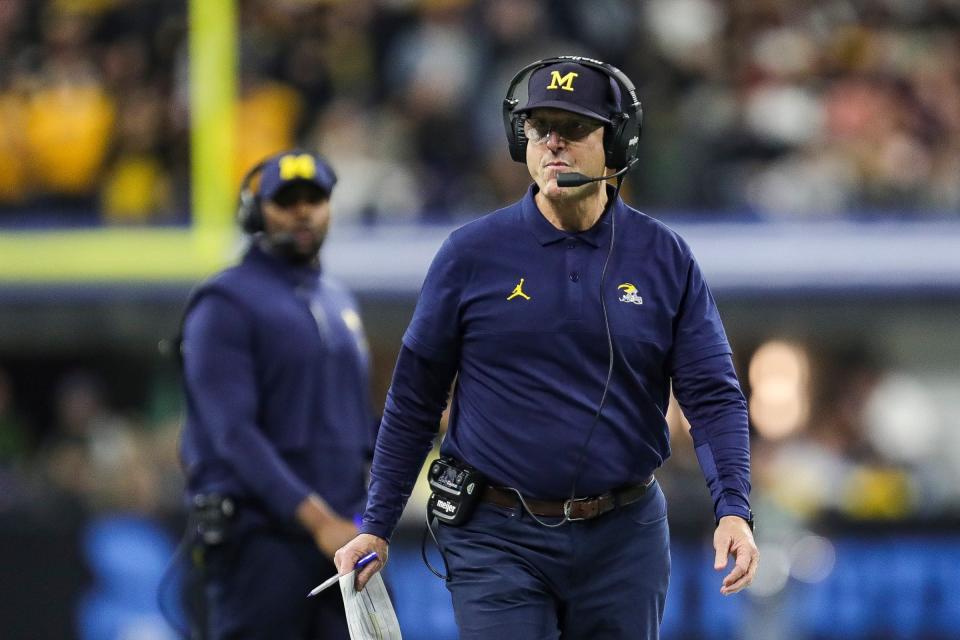Michigan football's once spotless reputation in tatters after decisions to win at all cost
Let me take you to a more realistic time, when hoity-toity Michigan football was beside itself over a coach steering the spotless football program deep into NCAA violation waters.
By practicing too much.
Now here we are, some 15 years and what seems like a lifetime of mediocre football later, and Michigan is protecting its long-awaited national championship of 2023 ― and how it was questionably built over the last four years ― at all cost. Reputation be damned.
The days of standing on that shining hill and proclaiming we're better than you are long gone. Michigan is no different than any other run-of-the-mill cheat.
Back and forth the shell game goes, with no pea in sight. The short con, everyone, is paying off.
Keep your hands and feet inside the car. It's a bumpy ride explaining this sordid mess.
In the last 11 months alone, Michigan suspended its football coach for three games, suspended him again for three more, picked fights with the NCAA and the Big Ten about the process of investigations into multiple rules violations from two separate cases, lost its head coach to the NFL, elevated an assistant to head coach despite his one-game suspension in 2023 for his part in the first NCAA investigation ― and hired him knowing he was an integral player in the second (yet to be resolved) NCAA investigation.
If you think that's a mouthful, we haven't even begun to peel back the layers of shameless defiance.
The second NCAA investigation of alleged advanced scouting of future opponents and the public carnival playing out with it ― complete with a Netflix documentary, no less ― brings us full circle to staring directly in the face of the last time Michigan dealt with NCAA violations from coach Rich Rodriguez. When then-Michigan president Mary Sue Coleman solemnly admitted humiliation and embarrassment, and athletics director Dave Brandon regretfully said, "nobody wants to be found guilty of these types of activities."
Again, for practicing too much.
More: Bowl projections: Preseason picks for who will make the 12-team College Football Playoff
More: Ranking the 10 toughest college football schedules starting with Florida, USC
Meanwhile, back in today's fantasy land, current Michigan president Santa Ono defended former coach Jim Harbaugh every chance he could get. He took to social media to back his coach, the same man the NCAA says "misled investigators" in the first NCAA investigation of illegal contact with players during the 2020 Covid season.
Then there's athletics director Warde Manuel, whose defense of all things Harbaugh during the homestretch of the national championship season was utterly comical. It's one thing to pick a fight with the NCAA over its inane rules and structure, it's quite something else to throw down with your own conference and new commissioner over a staffer who allegedly concocted a scheme to advance scout opponents ― giving Michigan an undeniable competitive advantage.

The same Manuel hired current coach Sherrone Moore knowing full well that Moore had been suspended once already for running afoul of the NCAA for his part in the first investigation. Manuel also knew that Moore had, according to the NCAA, 52 text messages between he and former staffer Connor Stalions the day after Stalions' alleged advanced scouting scheme was exposed.
And while we're on the subject of Stalions and his alleged scheme, let me make one thing unquestionably clear: there's not a coach in college football who doesn't know what every staff member contributes on a gameday sideline.
If you think the obsessively controlling Harbaugh would allow some random, low-level staffer to infiltrate his program and be trusted with in-game decisions without knowing everything about said low-level staffer, you the same person who believes there was a vast conspiracy that kept Florida State from the playoff.
This is what happens when a program sells its soul for a championship, when desperation leads to deception, and worse, outright cheating and flouting of rules. When chasing (and eventually catching and passing) bitter rival Ohio State is more important than the foundational moral flex of a "Michigan Man."
There's no better explanation and confirmation to the level of deceit than the first NCAA investigation of Michigan. Earlier this spring, the NCAA placed Michigan on probation for three years and Harbaugh was given a four-year show cause order in response to illegal contact with players ― and more damning, Harbaugh's "misleading" NCAA investigators.
In June of that same year, months before the Big Ten returned to play in October of 2020, Harbaugh and Big Ten coaches were on a conference call discussing the unique circumstances of the pandemic. It was then that Harbaugh accused Ohio State coach Ryan Day ― the same Day whose teams had beaten Michigan every season since Harbaugh returned to his alma mater in 2015 ― of illegal contact with players.
The very thing Harbaugh and his staff were doing at the same time, and later sanctioned for by the NCAA.
And wouldn't you know it, in his first public comment on the NCAA cases since leaving Michigan, Harbaugh stood tall earlier this month and puffed out his chest. Just like a Michigan Man.
"Never lie, never cheat, never steal," Harbaugh said during a Los Angeles Chargers weekly press conference. "I was raised on that lesson."
Says the coach who lied, cheated and, yes, stole signals.
The short con paid off, everyone. Reputation be damned.
This article originally appeared on USA TODAY: Michigan football got its national title at the cost of its reputation

 Yahoo Sport
Yahoo Sport 




































































